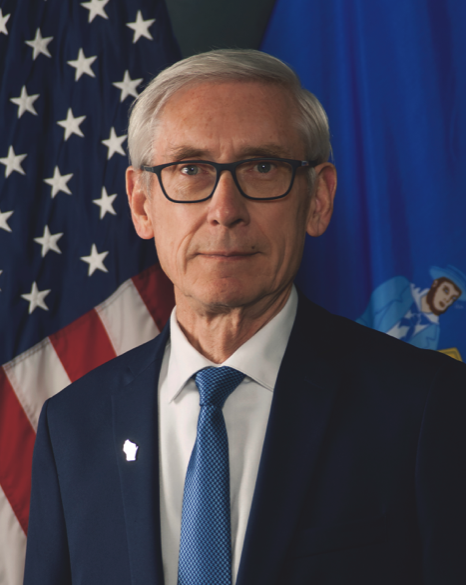Editor’s note: The following information has been released for publication by the the office of Gov. Tony Evers.
Gov. Tony Evers today announced he is directing the Wisconsin Department of Health Services (DHS) to invest $258 million in funding already designated for home and community-based services (HCBS) to create and fund a minimum fee schedule, effectively raising wages for direct care workers and providers serving older adults and individuals with disabilities. With Gov. Evers’ action today, Wisconsin will join 20 other states that have a minimum fee schedule for HCBS providers, including neighboring Midwest states of Illinois, Iowa, Minnesota, and Michigan.
The minimum fee schedule will establish minimum amounts managed care organizations (MCOs) must pay providers for certain adult long-term care services. According to DHS, the affected Medicaid programs include Family Care, Family Care Partnership, and Program of All-Inclusive Care for the Elderly (PACE), and these programs serve nearly 57,000 older adults and adults with disabilities. DHS estimates this funding and the creation of the minimum fee schedule, together, will provide a 15 percent rate increase for most supportive home care services and a 40.5 percent rate increase for most of the services provided at residential facilities, among other rate increases.
“I declared 2024 the Year of the Worker in Wisconsin to continue focusing on our efforts to address our state’s generational workforce challenges, chief among them efforts to bolster our healthcare and direct care workforces,” said Gov. Evers. “Our healthcare workers have faced significant challenges these past few years, and these investments will go a long way toward helping make sure workers receive the support and fair compensation they deserve. While this is an important step in helping us be able to recruit, train, and retain talented folks in our healthcare workforce, it’s going to be critical for these investments to continue in our next biennial budget so we can address chronic challenges and continue building a strong, stable healthcare industry for the future.”
“This is the right thing to do for Wisconsin’s long-term care system and the providers who care for our state’s most vulnerable,” said DHS Secretary Kirsten Johnson. “It’s a critical investment, making for a stronger workforce able to offer quality care and services, and ensuring people are able to stay in their homes and communities longer.”
The minimum fee schedule is a list of the lowest prices MCOs would be allowed to pay for services. By establishing the minimum fee schedule, Gov. Evers is ensuring the department can require MCOs to pass along rate increases to providers, ensuring stability and consistency in terms of revenue and expenditures for providers and MCOs alike. Gov. Evers first proposed creating a minimum fee schedule for certain long-term care services in his 2023-25 biennial budget, but Republican lawmakers who comprise a supermajority of the Joint Committee on Finance stripped this provision from the final budget. While the Wisconsin State Legislature and Gov. Evers have approved long-term care rate increases in the past, those increases have not come with a requirement as to the minimum amount to be passed along to providers.
The HCBS minimum fee schedule will direct $258 million from DHS’ allocation of American Rescue Plan Act (ARPA) funds designated specifically for HCBS programs and services. DHS estimates $350 million is available in ARPA HCBS funding to strengthen the state’s HCBS programs, address direct care workforce issues, and develop strategies to delay the need for long-term care. The minimum fee schedule applies to services for which no specific rates exist in fee-for-service Medicaid, and consequently, each MCO establishes a rate through its contract with the provider. These services include:
• Adult Family Homes;
• Community Based Residential Facilities;
• Residential Apartment Complexes;
• Supportive home care (SHC) agencies, and
• Self-directed SHC.
The minimum rates will go into effect Oct. 1, 2024, and DHS will systematically monitor that MCOs are paying providers at or above the minimums and will have contractual penalties if the MCOs fail to pay providers the minimums.
Since 2019, Gov. Evers and his administration have secured increases totaling over $1.2 billion for all areas of long-term care, including nursing homes, personal care services, home and community-based services, and more. A non-exhaustive summary of the Evers Administration’s efforts to date to support long-term care and Wisconsin’s healthcare workforce is available below:
• January 2024: Gov. Evers declared 2024 the Year of the Worker in Wisconsin and announced new efforts by to build a workforce prepared to meet the needs of a 21st-century economy, including creating the Governor’s Task Force on the Healthcare Workforce. Members of the task force are expected to release their final report detailing solutions to address the state’s healthcare workforce challenges this fall.
• August 2023: Gov. Evers called Legislature into a special session and proposed a comprehensive plan to address Wisconsin’s chronic workforce challenges, including directing nearly $60 million to address healthcare workforce shortage solutions.
• August 2023: The Evers Administration launched a new initiative, developed in partnership with the University of Wisconsin (UW)-Green Bay, to train over 10,000 certified direct care professionals to address the state’s shortage of caregivers.
• July 2023: Gov. Evers signed the 2023-25 biennial budget, approving nearly $500 million in increases for long-term care, including: a five percent increase for HCBS rates, $146.4 million for nursing home support services, $43 million for nursing home incentives and other increases, $38 million for family care reimbursements, $38 million for personal care reimbursements, and $8 million for Aging and Disability Resource Centers.
• April 2023: Together with UW Health and Madison College, the Evers Administration launched one of the country’s first-ever Registered Nurse apprenticeship pathways.
• January 2022: Gov. Evers and DHS directed American Rescue Plan Act funds to increase reimbursement rates by five percent for several types of HCBS provided to members of Wisconsin’s Medicaid programs. This new investment comes in addition to previous federal investments directed to support long-term care services during the pandemic, including more than $75 million in direct provider payments to nursing homes and $30 million for the admissions incentive program.
• July 2021: Gov. Evers signed the 2021-23 biennial budget, providing $104 million to increase direct care rates, $78 million to increase personal care rates, and an increase of $252 million for nursing home reimbursements.
• July 2019: Gov. Evers signed the 2019-21 biennial budget, providing over $230 million to support workers who provide direct care to Wisconsinites in Family Care, nursing homes, and individuals receiving personal care services.
• February 2019: Gov. Evers signed Executive Order #11, establishing the Governor’s Task Force on Caregiving.













What does Whitewater have planned for our allotment?